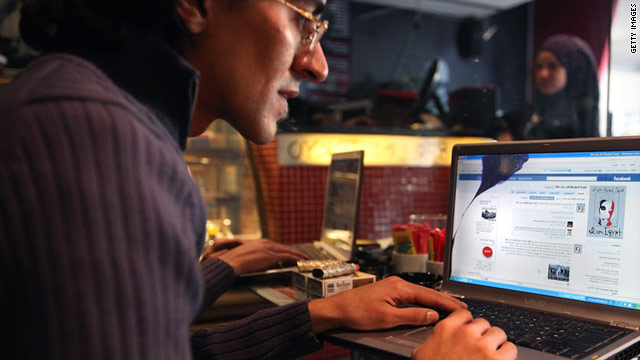Reports say Egypt Web shutdown is coordinated, extensive

A man at a Cairo, Egypt, cybercafe checks Facebook on January 27, before widespread Web outages occurred.
STORY HIGHLIGHTS
- Web experts, residents of Egypt reporting near total blackout of internet service
- Internet monitors report that Web activity in Egypt plummeted at 5:28 p.m. ET Thursday
- Egypt government denies blocking web amid protests
- Facebook, Twitter had been disrupted before blackout, activists say
To combat social media, another important weapon for the demonstrators, outside experts and people living in the country say the government has coordinated a blockage of certain communications websites and unplugged internet access entirely to parts of the country.
On Thursday, protesters active on Twitter and Facebook, publicly documenting demonstrations on the streets of Cairo, Alexandria and other cities, went quiet. Around the same time, many websites centralized on servers in Egypt disappeared.
On Friday, that Web shutdown seemed to be holding.
Reports continued to flood Facebook and Twitter that land line service has been shut down in some Egyptian cities, though it's unclear whether that came as a result of a government edict or overloaded networks.
Cellular telephone operators were told by authorities to suspend services in parts of Egypt, according to a statement from Vodafone, a global cell carrier that operates there.
A major halt in connectivity apparently came at 5:28 p.m. ET, when servers in Egypt were taken offline, according to a report by internet monitoring organization BGPmon.
Six minutes later, the Committee to Protect Journalists, which had been following the situation in Egypt through online sources, reported that 10 of its contacts vanished at the same time from instant-messaging systems.
The phenomenon was also observed by Arbor Networks, which reports that internet traffic to and from Egypt dropped "precipitously" within that hour Thursday.
Before Thursday's seemingly more concerted halt of internet services, access to Twitter and Facebook in Egypt was becoming spotty.
These services have played major rules in protests in Tunisia and Iran and for dissidents in China. They had begun to explode alongside street protests.
"We are aware of reports of disruption to service and have seen a drop in traffic from Egypt this morning," a Facebook spokeswoman said Thursday.
Facebook has been referring requests for comment to Herdict.org, a Harvard University project chronicling potential censorship of the Web around the world.
The tool reports a major spike in the past few days in Egyptians reporting that both Facebook and Twitter were inaccessible. Herdict reports of any kind in Egypt slowed significantly on Friday, presumably due to residents not being able to access any websites as a result of the shutdown.
"Egypt continues to block Twitter and has greatly diminished traffic," said a message Wednesday from global representatives for the microblogging site.
The Egyptian government has said publicly that it is not censoring websites.
The Egyptian protests are meant to challenge a lack of basic amenities, from affordable food to a decent standard of living. The target is Hosni Mubarak, the nation's 82-year-old leader.
When social media websites were blocked, many in Egypt had found their way around it by using software called proxies.
This remains a common practice for people in China looking to skirt the government's "great wall" blocking certain Web services. Proxies can trick internet providers and routing services designed to block certain cities or countries into believing that a person is located elsewhere.
No comments:
Post a Comment